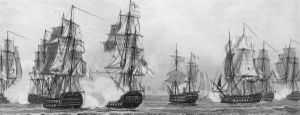Thomas Whitcombe
| Thomas Whitcombe | |
|---|---|
| Born | 1763? |
| Died | c. 1824? |
| Nationality | British |
| Field | Marine art |
Thomas Whitcombe (possibly 19 May 1763 – circa 1824) was a prominent British maritime painter of the Napoleonic Wars. Among his work are over 150 actions of the Royal Navy, and he exhibited at the Royal Academy, the British Institution and the Royal Society of British Artists. His pictures are highly sought after today.
Life





Thomas Whitcombe was born in London between 1752 and 19 May 1763, with the latter date frequently cited.[1] Little is known of his background or training, although speculation based on the locations depicted in his paintings may provide some clues.
It is known that he was in Bristol in 1787 and later travelled to the South Coast; there are few ports or harbours from this region that do not feature in his work. In 1789 he toured Wales and in 1813 he travelled to Devon, painting scenes around Plymouth harbour. During his career he also painted scenes showing the Cape of Good Hope, Madeira, Cuba and Cape Horn. Between 1783 and 1824 he lived in London, including addresses in Covent Garden and Somers Town during the course of his exhibiting career.
His date of death, like that of his birth is uncertain; it was not before 1824, and possibly as late as 1834.
Style
His range of work embraced naval engagements, ship portraits, coastal scenes with shipping and ships at sea in fresh breezes and storms. The topography of the background is interesting and well observed and the depiction of the ships themselves detailed and technically very correct, a legacy of time spent in dockyards studying the subject matter. The backgrounds are delightfully atmospheric and, like many British marine artists of the 18th and 19th century, Whitcombe favoured a dark foreground.[2]
Artistic Achievement
Whitcombe was, with Nicholas Pocock, Thomas Luny, Francis Holman and Robert Dodd, a leading maritime painter of the French Revolutionary Wars and Napoleonic Wars. He painted over 150 actions of the Royal Navy including fifty plates for The Naval Achievements of Great Britain, a splendid volume issued after the cessation of hostilities.[3]
He exhibited at the Royal Academy fifty-six times between 1783 and 1824 and once each at the British Institution and the Royal Society of British Artists.[2] Many of his paintings are today in the collection of the National Maritime Museum, Greenwich, and in other important naval collections around the world.
Bibliography
- A Dictionary of British Marine Painters, Arnold Wlison, A & C Black Publishers Ltd, 1970, ISBN 0-85317-051-7
- A Dictionary of British Landscape Painters, M H Grant, Leigh-on-sea, 1952
- The Dictionary of 18th Century British Painters, Ellis Waterhouse, published by Antique Collectors' Club Ltd, 1981, ISBN 0-902028-93-6
- British 19th Century Marine Painting, Denys Brook-Hart, published by Antique Collectors' Club Ltd, 1974, ISBN 0-902028-32-4
External links
| Wikimedia Commons has media related to Thomas Whitcombe. |
- Thomas Whitcombe paintings at the National Maritime Museum
- Thomas Whitcombe Biography at the Berger Collection
- Thomas Whitcombe paintings at the National Library of Australia
References
- ↑ He is recorded as entering the Royal Academy Schools as a student on 8th March 1781, his age is recorded as 18 since '19th last May'
- ↑ 2.0 2.1 "Thomas Whitcombe Biography at John Bennett Fine Paintings". Retrieved 2008-02-28.
- ↑ "Thomas Whitcombe Biography at ArtNet". Retrieved 2008-02-28.
|